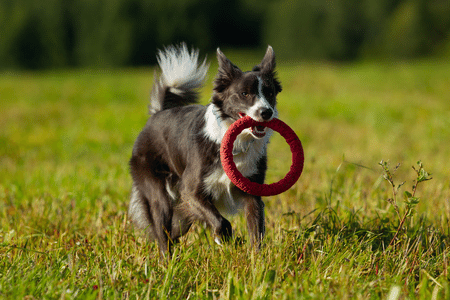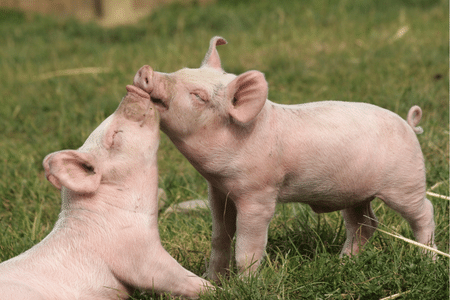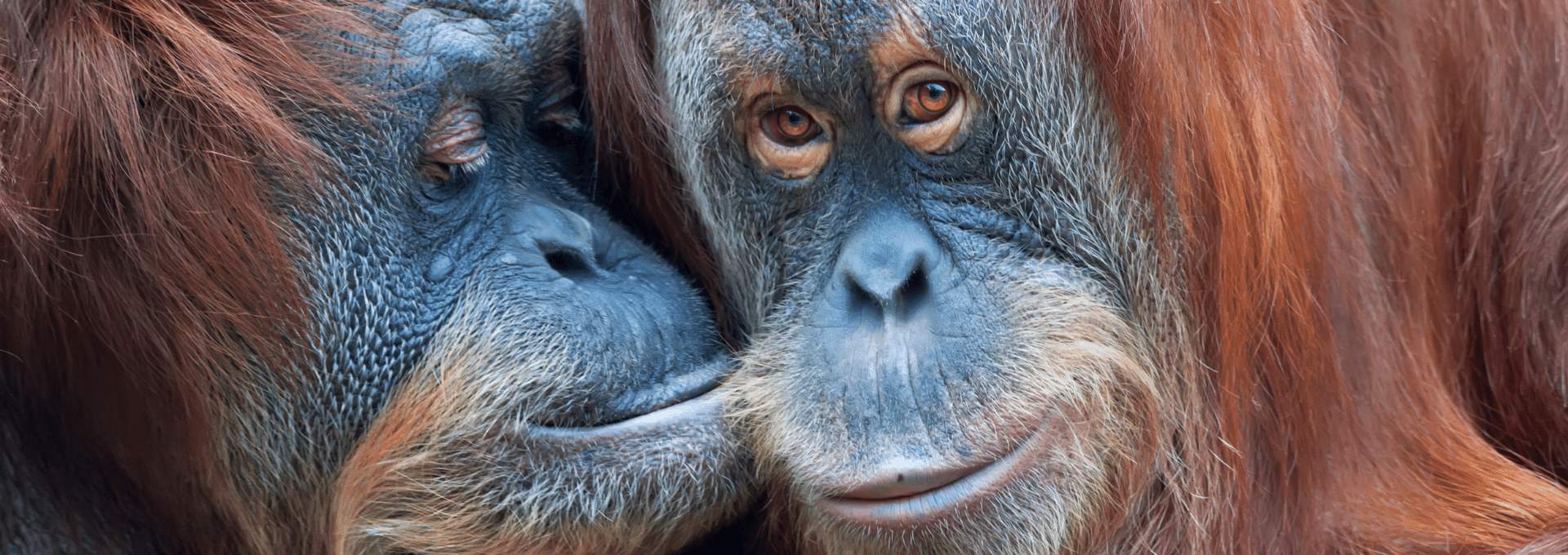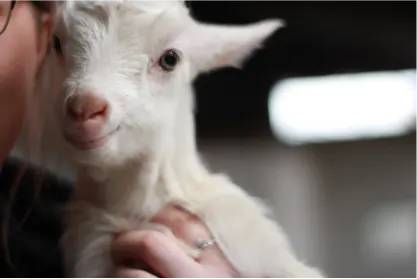Just as the animals differ from one another, humans also differ in many properties from other animal species. To justify the fact that you can take the lives of the animals to satisfy your own taste buds, often the difference between humans and animals is highlighted. But what are these differences? And how big are they really?
The animal kingdom
Today, in every biology class, one can learn that the human body is assigned to the animal kingdom. Genetic research makes it increasingly clearer how little man distinguishes himself from other animals. The differences are so minimal that one has long been planning to replace defective human organs with animal (e.g., pig). Purely physically or genetically, the differences between a butterfly and an elephant are much greater than between a human and a chimpanzee. Therefore, biologically there is no point in separating humans as much from the rest of the animal world as some would like to.
Physical superiority
Man has a very universally usable body. Man can do a bit of everything, but he does not master anything better than any other animal. The cheetah runs much faster, the eagle sees better, the dolphin swims better, the birds fly better, dogs smell better, a gorilla is much stronger etc. In no field of physical ability is man superior to animals.
Here one may argue that people today can fly thanks to their technology and can move faster than all other animals. However, most of these technical achievements have been developed only in the last decades to centuries. But man was already a man before that. After all, no one claims that people 1000 years ago were not real people because they did not yet have the current technical means.
Communication skills
But man has developed a highly complex language? This communication ability has no other animal?
This myth too has been relativized by research in recent years. It was found that whales can communicate over many kilometers. The human language, on the other hand, reaches a few hundred meters at best.
The language of some animals is so complex that until today it could not be completely deciphered. On the other hand, it is not even that difficult for some animals to learn parts of human language. In July 2004, the Border Collie Rico was introduced in a science magazine that understood 200 words.1 In a scientific experiment he was able to assign 37 of 40 new toys correctly after mentioning the names only once. Try to copy this once. To keep 37 of 40 words of a foreign language after a single listening . This achievement is now being topped by Chaser, a border collie lady. She has learned the names for over 1000 toys within three years. In addition, she also understands the meaning of various upper categories, "ball" for example, stands for the total of 116 soft balls, "Frisbee" for 26 different discs. In this top performance, even the animal psychologist working with her come to their limits, because sometimes the female dog can identify the objects more reliable than the scientists working with her.13

It was shown that not only apes, parrots, dolphins and sea lions have such remarkable language abilities. The more animals you study intensively, the more you are surprised about their abilities.
A major problem in researching the communicative ability of animals is that they do not have a larynx like humans, and most therefore can not produce the same sounds. In experiments with monkeys, this problem could be avoided by communicating with them via symbols that were recorded on tablets. The bonobo monkey Kanzi could use around 200 symbols correctly. He thus not only formed predetermined sentences, but also invented his own sentences with the available symbols.2 At the beginning of the experiments, the scientists still thought that the symbols must have a relation to the corresponding expressions. Later, however, it was found that even completely abstract symbols can be learned from him.
In addition, there is more and more evidence that most animals can communicate telepathically.3 This would be far superior to acoustic human speech, as telepathy is distance-independent and much faster. In addition, this would also solve the Babylonian language confusion of people …
There is certainly much to explore in this area. With every new insight, however, the predominance of people in the field of communication seems to be waning.
Culture / tools
Especially in different groups of monkeys, one could also find a cultural tradition within the species. Which also brought down this privilege of the people. At the same time, such different cultural manifestations also show that the animals are not only genetically conditioned to respond to environmental conditions. For example, use and manufacture of certain tools within a group are passed from generation to generation.4 Only a few decades ago, it was thought that the manufacture of tools was unique to humans. However, Cambridge University researchers have proven that crows are true masters of tooling. The animals are able to skillfully bend a wire into a hook to fish a small container of food from a larger container.5
Self-confidence
To be aware of oneself and think about oneself. This has long been considered a major difference between animal and human consciousness. Today, many psychological studies have shown that even in this respect, human consciousness differs only slightly from the animal. Especially with monkeys and dolphins one established undoubtedly a self-confidence.
The often asked question, whether animals can recognize themselves in the mirror, could definitely be affirmed, at least for the great apes.6
Intelligence
But man is clearly smarter than the animals!? Intelligence usually refers to the ability of the logical intellect. No animal can solve a complex integral equation, but many people can not either. In an intelligence test, an adult chimpanzee would fare better than a newborn human child. Is therefore the chimpanzee more human than the human infant?
Since humans develop more slowly after birth than many other animals, even monkeys of the same age are intellectually superior in the first few months.7 And chimpanzees work faster and more accurately than humans on the computer. This is the result of a study by Japanese researchers at the University of Kyoto, in which an attempt was made with students to reproduce series of numbers that flash only briefly on the test monitor.
For the demarcation between man and animal, therefore, the intelligence is not suitable.

Pigs are at least as intelligent as dogs. Yet they are treated differently by humans.
Sense of justice / fairness
To judge whether something is fair, one must be able to make comparisons and put oneself in the position of others. For a few years, it has been scientifically proven that this ability is not reserved for humans alone. The science journal "Nature" reported in September 2003 on an experiment with capuchin monkeys:8 They could exchange tokens for cucumbers. Everyone was satisfied until one of the monkeys received the much more popular grapes instead of the cucumber. This was felt to be so unfair that the others spurned their otherwise coveted cucumber, sometimes even tossed their pieces while the other received more for it. Equal pay for the same job seems to be a requirement that is valid even among monkeys. Even with chimpanzees the sense of justice could be proven.9
Humanity and compassion
Even the word humanity shows that it is believed that only humans have the ability to act humanely. Meanwhile, however, we know that humanity and charity are not an exclusive privilege of the people. Compassion and cohesion can often be more pronounced in animal groups than in many groups of people.10 (More in the category "Compassion: Selfless action in the animal kingdom")
Superiority of the animals
Not all differences between humans and animals are positive for humans. Once again, this was seen in the tsunami disaster in southern India: The wild animals all got to safety in time. There were hardly any injured or dead wild animals.11 For the people, however, the tsunami came as a complete surprise.
Since we humans do not have such abilities, it is particularly difficult to accept them or even to explore them. Nevertheless, there is always evidence that man can be inferior to the animals in some respects.
Superiority of man
Despite everything, people have "subdued" the earth. However, this was not done on an ethical, moral basis, but on the simple right of the fittest, since man is far superior to all animals in the production of killing weapons. Furthermore, no animal is as flexible in thinking and acting as humans.
But to use this as a justification for today's treatment of our fellow creatures requires the suppression of all those traits that are repeatedly claimed to put man above the animal: Compassion, charity, morality. If these qualities, which humans deny to the animals and do not want to give them, would be developed, a new coexistence between humans and animals could arise, from which both sides would benefit greatly.
To stop treating animals as mere foods and kill them as meat suppliers would be a first and necessary step to harmonize the human-animal relationship. It would be enough to acknowledge that the capacity for suffering between humans and animals does not differ fundamentally.
Renato Pichler
Book tip
For those who want to learn more about the intelligence and feelings of animals, a new book by Jonathan Balcombe is available. InIn "animal pleasure" the Animal Behaviorist reveals that animals are well able to express positive emotions such as joy.
The book is also available in English and can be ordered online at www.amazon.de.
ISBN 1403986010
www.pleasurablekingdom.com
- Collie dog’s word power impresses, BBC news, 11. Juli 2004
- Sue Savage-Rumbaugh und Roger Lewin: Kanzi, der sprechende Schimpanse: What distinguishes the animal from the human mind, Droemer-Knaur-Verlag, 1995
- J. Allen Boone: Kinship with all Life – Simple, challenging, real-life experiences showing how animals communicate with each other and with people who understand them.
Und: "Testing a Language - Using a Parrot for Telepathy" von Rupert Sheldrake
Further books on this topic: Interspecies communication - Michael Krützen: Hüterinnen des Wissens – Bei Delfinen werden Kenntnisse von Mutter zu Tochter weitergegeben, 7.6.2005
- National Geographics News: Crow Makes Wire Hook to Get Food, 8.8.2002
- Volker Arzt und Immanuel Birmelin: Haben Tiere ein Bewusstsein? – When monkeys lie, when cats think and elephants are sad, Goldmann-Verlag, 1995
- Der Spiegel: Bruder Affe ist manchmal schlauer, 13.2.2005
- Sarah F. Brosnan: Monkeys reject unequal pay, Nature 425, 297-299 (18.9.2003) und:
Der Spiegel: Gerechtigkeitssinn: Monkeys do not want to trade cucumbers, 18.9.2003 und: Stern: Verhaltensforschung: Affen haben Gespür für Gerechtigkeit, 17.9.2003, ORF: Affen haben einen Sinn für Gerechtigkeit - Hamburger Abendblatt: Sense of justice of the monkeys, 1.2.2005
- The world: Mourning elephants attack a village, 24.5.2004
- EVANA: Nach Tsunami: Animals fascinate people, 18.1.2005
- Animal parenting, personality and pair-ups
- Video: www.youtube.com/watch?v=KbI13nbDRRI
Intelligente Tiere:
- Zwischen Instinkt und Intelligenz: Wie klug sind Tiere?, scinexx, 29.10.2004
Affen:
- Schimpansen haben Manager-Qualitäten, Spiegel Online, 2.3.2006
- Great Ape Trust: Language of the Bonobos
- Schimpansen handeln uneigennützig, Spiegel Online, 26.6.2007
- Orang-Utans nutzen Wasser als Werkzeug, Wissenschaft.de, 4.7.2007
- Gedächtnistest: Menschenaffe schlägt Mensch, Spiegel, 4.12.2007
- Affe schlägt Mensch – Studie: Chimpanzees have a better memory for number series than students, Wisenschaft.de, 4.12.2007
- Affen haben besseres Erinnerungsvermögen als Menschen, Speigel Online, 15.2.2013
- Gespräche unter Verwandten: Schimpansen aus dem "Chimpanzee and Human Communication Institute" (CHCI) unterhalten sich in Gebärdensprache und beherrschen dabei 240 Zeichen. Spiegel Online, 17.12.2007
- Mit Affen kann man rechnen: Auch Rhesusaffen können rechnen, Wissenschaft.de, 18.12.2007
- Mit Pinsel auf Termitenfang: Schimpansen basteln sich gezielt Werkzeuge, Wissenschaft.de, 4.3.2009
- A Voluble Visit with Two Talking Apes, National Public Radio, 8.7.2006
- Auch Affen knobeln einfach nur zum Spaß, scinexx, 26.2.2013
- Kooperation: Schimpansen sind echte Teamplayer, Spiegel Online, 19.3.2013
- Mitgefühl bei Schimpansen: Gähnen ist ansteckend - nicht nur unter Menschen, Spiegel Online, 12.3.2014
Vögel / Hühner:
- Singvögel merken sich Melodien ähnlich wie wir, Scinexx, 6.2013
- Ein Werkzeug für das Werkzeug für das Futter (Krähen), Wissenschaft.de, 17.8.2007
- Dohlen haben ein Gespür für menschliche Gesten, 3.4.2009, Bild der Wissenschaft
- Die vermeintlich dummen Hühner können rechnen, 1.4.2009, Bild der Wissenschaft
- Krähen verwenden richtige Werkzeuge ohne Training, 7.8.2009
- Stare verstehen Schachtelsätze, 27.4.2006, Spiegel online
- Kluge Rabenvögel: Krähen können Werkzeuge situationsabhängig einsetzen, 21.4.2010, Bild der Wissenschaft
Mäuse und Ratten:
- Ratten mit Episodengedächtnis: Nager erinnern sich detailliert an Erlebtes und den Ort und die Zeit des Geschehens, Wissenschaft.de, 14.7.2006
- Ratten wissen, was sie nicht wissen, Wissenschaft.de, 9.3.2007
Meerestiere:
- Delfine erkennen sich am Namen, 9.5.2006, Spiegel online
- Delphin holt sich Hilfe bei einem Taucher (Video)
- Oktopus trägt Kokosnussschalen: Erster Beleg für Werkzeugnutzung bei einem wirbellosen Tier, scinexx, 17.12.2009
- Schiffslärm stresst auch Krebse, scinexx, 27.2.2013 und Bild der Wissenschaft.
Hunde:
- Hund schlägt Baby: Geistige Fähigkeiten entsprechen denen zweijähriger Kinder, 10.8.2009, Bild der Wissenschaft
- Der Hund denkt mit – Tiere knacken ein vermeintlich menschliches Privileg,scinexx, MaxPlanckForschung
Andere Tiere:
- Erdmännchen sind gute Lehrer: Lehrer, die sich aktiv um ihre Schüler kümmern, wurden bisher nur unter Menschen vermutet - und unter Ameisen, Spiegel Online, 14.7.2006
- Elefanten erkennen ihr Spiegelbild, Wissenschaft.de, 31.10.2006
- Katze Oscar erkennt, wann jemand stirbt: Angehörige erhalten Zeit sich zu verabschieden, Spiegel Online, Juli 2007
- Auch Bienen können lesen, Wissenschaft.de, 17.12.2009
- Verhaltensforschung: Elefanten erkennen Menschen an der Stimme, Spiegel Online, 11.3.2014




